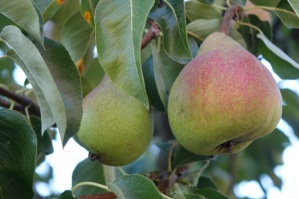Let It Remain
Comfort of name,
of pleasure
freshened in
repetition, unformed
pears falling, and
the mockingbird’s
inability
to complete
another’s song.
I will take no
moment
from this day
but let it remain
here in the knowing,
in the tyranny
of the absolute
and its enforced
rhythm desiring
both flight and
maturation,
the ecstasy
of fruit grown full.



Thanks for this.
LikeLiked by 1 person
Thank you, Jane!
LikeLike
beautiful…
LikeLiked by 1 person
Thanks!
LikeLike
Absolutely wonderful!
LikeLiked by 1 person
You’re very kind, Dennis. Thank you.
LikeLiked by 1 person
Indeed…
the ecstasy
of fruit grown full.
LikeLiked by 1 person
…and of those who partake.
LikeLike
very nice. a perfectly ripe pear is one of life’s eternal joys.
LikeLiked by 2 people
We had to take down our pear tree a while back. I miss its blossoms more than the fruit!
LikeLike
ok. blossoms are nice but…nothing compares to tree ripened fruit.
LikeLiked by 1 person
Looking at fruit hanging in a tree is awe-inspiring, I must admit.
LikeLiked by 1 person
I am intrigued by the tension in this beautiful poem! The narrator’s apparent comfort with the ideal of “fulfillment” is so convincing, it makes me wonder about your hints of criticism of that “tyranny of the absolute” trumping the (incomplete) place of “here in the knowing” (where, it seems, we either don’t know how to be, or shouldn’t bother *remaining*). Do I rightly detect a twinge of resentment toward the “enforced” desire in us (or in nature?) to strive toward maturation/perfection, because it means we’re missing something even more miraculous, or fundamental along the way? This is such a compelling concept (which, if I haven’t misunderstood, I believe is lost on many, and therein lies the greatest frustration for the poet…). I’d love it if you’d be willing to shed a bit of light on your impetus for this amazing piece! Don’t leave me dangling like an unripe pear! 😉
LikeLiked by 1 person
I think you’ve hit the nail on the head – there’s a bit of discomfort, if not resentment, in the awareness of the dichotomy of unknowns and the absolute, of the unformed and the ripe. The poem began initially as a simple observation of the pear tree in my back yard, but grew, over the years, into something else, as these things do. 🙂
LikeLike
I feel you’re speaking to something I sensed in reading the poem too. I’ll describe it as balancing appreciation for the miracle of the moment and anticipating/enjoying Creativity’s maturation. A challenge in our high-tech, outcome-based world. Hence the loveliness to me of this poem and pear trees.
LikeLiked by 2 people
Agree wholeheartedly
LikeLiked by 2 people
“the ecstasy/of fruit grown full.” Ah, but whose ecstasy? The rhythms, but whose rhythms? Very philosophical and existential, as ever, Bob. Certainly, we have seen pears, tasted them, held them, smelled them, but we cannot know how to form a toughish flesh, when to ripen, when to fall, where to add that bit of moisture, where to repel it. Not lost on this narrator, I’m sure, is the pun of pear-pair-pare. The poem is sensual and beautiful, full of regrets and longing and just lovely, title to end. I would say I’m amazed, but I’ve come to expect that reading your work.
LikeLiked by 1 person
On the one hand, I loved the tree (lovely white blossoms in early spring), but it was messy and drew wasps more than bees, and its fruit wasn’t all that tasty. In the end it became diseased and we had to cut it down. Regrets and longing: yes!
LikeLiked by 1 person
A great poem Robert! For me, it displays your maturity as a writer – dripping fully grown words in perfect places; creating depth of meaning beyond the imagery and evoked emotions. Love it! Thank you for sharing.
LikeLiked by 1 person
Thanks, Rob. I am at the very least aging rapidly!
LikeLiked by 2 people
Lol 🙂
LikeLiked by 1 person
I want to dive into this and never leave♡
LikeLiked by 1 person
You’ll have to leave eventually. One can eat only so many pears. 🙂
LikeLiked by 1 person
Pear juice? Pears with huevos rancheros?
LikeLiked by 1 person
Hmm. Pear cake. Poached pears. Grilled pears. Pear butter. Maybe you’re right.
LikeLiked by 1 person
Loved the rhythm and the expectation of that fully ripened fruit. By the way, check your emails…have sent you some correspondence. Learnt about you through holisticwayfarer, of whom I am a big fan!
LikeLiked by 1 person
Thank you! I haven’t received your email – please send again.
LikeLike
sent 🙂
LikeLiked by 1 person
Thanks.
LikeLike
This is very beautiful, thank you!
LikeLike
Thank you for your kind words.
LikeLike
Gorgeous and so profound.
LikeLiked by 1 person
Thanks very much.
LikeLike
Loved this! Thanks for sharing ❤
LikeLike
Thank you for reading!
LikeLike
Thanks for your visit. I liked your post. 🙂
LikeLiked by 1 person
It’s always a pleasure to visit, Thia.
LikeLike
“the ecstasy
of fruit grown full.”
… The extasy that grows together with the awareness of death.
LikeLiked by 1 person
Indeed.
LikeLike
“but let it remain
here in the knowing”
Love it, and how you “developed” the poem. 😉
LikeLiked by 1 person
Thank you, D!
LikeLike